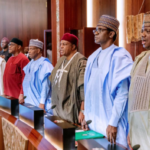
A former Deputy Governor of the Central Bank of Nigeria and now Chairman of Titan Trust Bank, Dr. Babatunde Lemo, speaks with OYETUNJI ABIOYE on the nation’s banking sector, foreign exchange crisis, among other issues
With the ongoing war between Russia/Ukraine, what are the factors limiting Nigeria from tapping effectively into the oil global market?
Let me just put this in two compartments. The Ukraine crisis is global. Of course, you know that Ukraine, and Russia account for about 30 per cent of our wheat imports and it is a staple food. Wheat is used in bread production and the situation is worse even in North Africa and the rest of the world. So, we’re having a serious food crisis because there’s a crisis in Ukraine that is global, and this is adding even to our food inflation, which today is in excess of 20 per cent. But we also have a peculiar problem in Nigeria because our currency is also crashing by the day, no thanks to oil theft. One of the major captains in the industry actually told us that Nigeria may be losing about 700,000 barrels per day and that’s quite humongous. If you compute that at the rate of $100/barrel, that’s a lot that we are losing. And so, if we have this coming into our foreign exchange earnings, we will not be having the crisis that we are having today. The foreign exchange crisis that Nigeria is having today is as a result of local problems. In addition to that is the subsidy which the government can no longer afford to make provisions for. We may end up with about N6tn to N7tn subsidy bill at the end of the year. Can we really afford that? The labour unions insist we continue to subsidise oil, but they forget that this money could have gone into education, health, security and so on and so forth. I feel we need to sit down and have a conversation and this should be on a bipartisan basis. Let’s have a conversation about the fact that we cannot sustain this subsidy, every other country all around us sell crude at least double the price at which we do. So, today, we’re being battered from all fronts, and we need to really address these challenges.
Do you think the COVID-19 pandemic and the ongoing war in Ukraine have had a significant negative impact on banks especially Nigerian lenders?
I want to give kudos to the Nigerian banking sector, as the banks are very resilient. You will find that COVID did not really deter services provision, and prior to COVID, there was the significant transformation of the banking sector, which is why today you don’t need to visit your bank branch to enjoy banking services. That’s why the banking sector was not terribly affected by COVID. Indeed, they actually assisted in ensuring that we get out of COVID through donations, as they were undertaken through the central bank to fight the virus. And so, post-COVID, I believe well that it can no longer be business as usual. COVID has actually opened our eyes to better ways of doing things as you can actually work from the comfort of your home. You don’t have to go to work every day of the week, provided of course, you can work from home. For me, I look at the opportunities that COVID has actually provided to mankind and not the setback that we have for the 12 to 18 months that we had COVID.
Nigeria’s inflation rate hit 19.64 per cent in July 2022, driven by food components. As a former CBN deputy governor, what advice will you give to the present CBN administration?
I will say what advice do I have for Nigerians? You see, people don’t understand this. High inflation is as a result of so many things, some exogenous to the central bank, and some within the purview of the CBN. But we have a country where we are almost at war, and of course, you know what is happening to capital flight as a result of this. You know what is happening to food inflation because people are not allowed to work in farm. The entire Middle Belt is having a very serious problem and that’s the food basket of the country. Once you don’t have farmers who can go to their farms without any hindrance, then you have a serious spike that we have seen today. And then, of course, you can no longer travel freely by road and don’t forget that goods are also transported from one part of the country to the other. There is a significant oil theft in the Niger Delta that is also affecting our currency and thereby bringing imported inflation. So, when you sit down and ask: Is it the central bank that should be battered, yes, they need to sit and do a lot more on their own, but I think it is the entire country. The government, in particular, needs to ensure that they provide security for lives and property. They need to work on oil theft. When we have done all of that, then we can then sit down and tell the monetary authority that there are other things that you also need to do, which of course may also include ensuring that the Ways and Means Advances are moderated.
What is your view about the increase in the nation’s GDP in the second quarter, according to the NBS?
Well, for the GDP growth, everybody is celebrating it, I’m not celebrating it because we need to decompose that GDP and see where those growths are coming from. If they’re coming from sectors that do not impact the lives of average Nigerians, I’m not going to celebrate it. If the growth for instance is coming from the Information Communication Technology, agriculture and manufacturing sectors-all these are commendable. But then, how do we then ensure that this translates into a reduction in employment rate and positively impact the human development indices? That’s when the man on the street will reap the benefit of a high GDP. GDP growth is good, but I will say it is a necessary but not sufficient condition for improvements in people’s lifestyles. We must ensure that we do something about the unemployment rate that is high. We must do something about the security of lives and property so that people can go to work. We must continue to encourage young people. I think most of the growth that we are celebrating is from the young people as their potential is greater. This is a country that should be growing at double digits. We’re celebrating 3.5 per cent growth when our population is growing at 3.1 or 3.2per cent. We are flat on a per capita basis, provided of course that is sustained. If it is not sustained then, on a per capita basis, we will need to jumpstart a kind of growth process that will take us from a per capita income of just over $2,000 to $5,000 or $6,000; and then we will be celebrating.
With the competition posed by fintech firms, do you think banks must raise their game to protect their revenue and business?
The banking sector is already leveraging fintech as you can see that many of these new microfinance institutions are fintech-led, and many of the new generation banks are fintech-led also. I head Titan Trust Bank, of course, we leverage fintech for all that we’ve been able to do in the past four years. So, the banking sector already knows that there is a major disruption in banking activity and that is fintech. It is either they embed that in the way they run their business or they will be overrun by the fintech companies, which are already making a foray into the financial services industry.
About the FX crisis, what are the best ways the CBN can tackle these challenges and make the local currency competitive at the global market?
I do not think EFCC’s threat to arrest foreign exchange hoarders is the solution and that the way out is to allow the free flow of foreign exchange. Let’s have a policy, both fiscal, monetary and trade policy, that will ensure that the economic players actually move dollars into Nigeria because they know they will make money. So the central bank should ensure that there is rate stability, they should ensure that the forex market is done in such a way that it is easy to bring liquidity from other spheres.
As the chairman of Titan Trust, do you foresee more mergers and acquisitions in the Nigerian banking sector?
Well, that’s clearly something that will not go away, just as you can see it even in the international financial services sector. Today, you see JP Morgan Chase is almost a combination of four institutions. And that will continue, and so, that will also continue in Nigeria. You see, what is very certain is that the global economies is very dynamic, it is no longer the big fish that swallows the small fish. It is a smart one that swallows the ones that are not smart. So, you will continue to see more and more of that. And that’s pretty much because of the nature of the global economy and the Nigerian economy will not be an exception.
As a former CBN deputy governor, do you think Nigerian banks are doing enough to tackle the issue of high non-performing loans?
NPL is a reflection of the state of the economy and it is elevated. My prognosis is if care is not taken, it’s going to be elevated further still; because when you have a stiff economic environment that is very hostile, business failure will be more common. And once that happens, of course, default rates will go up. The only way we can address that is for the overall financial environment, the overall economic environment have to be more-friendly. This is apart from the fact that they (banks) need to ensure that their underwriting skill is sharpened and they need to ensure that they are embedding risk management in the way they do things.




